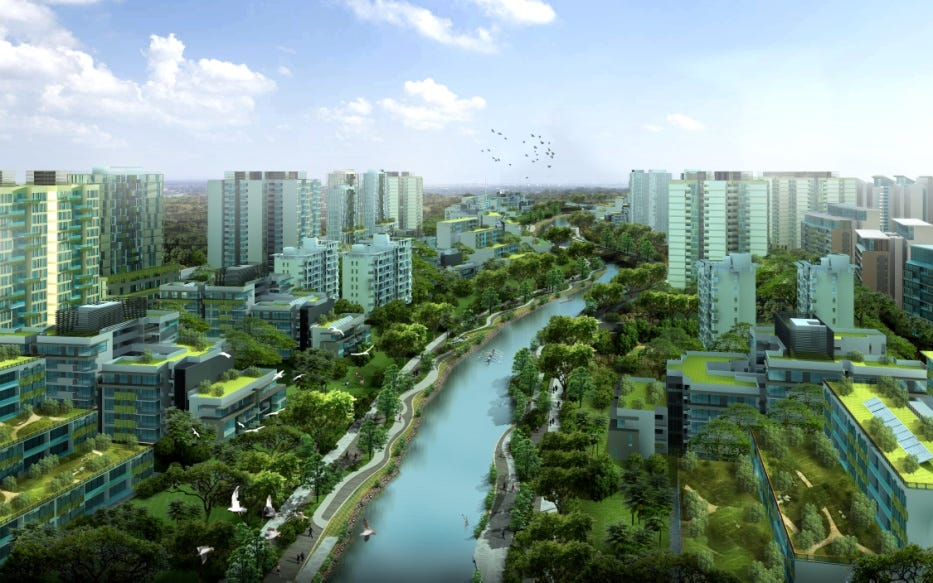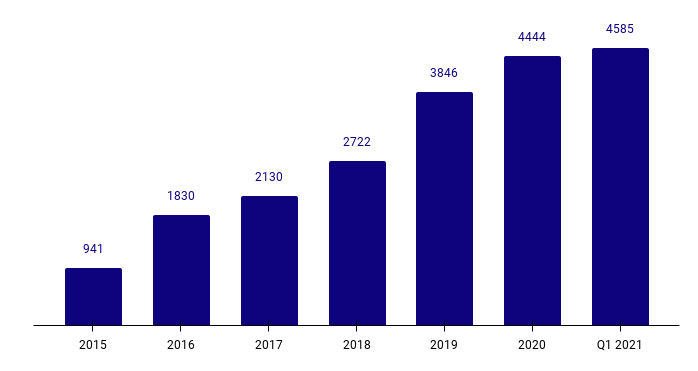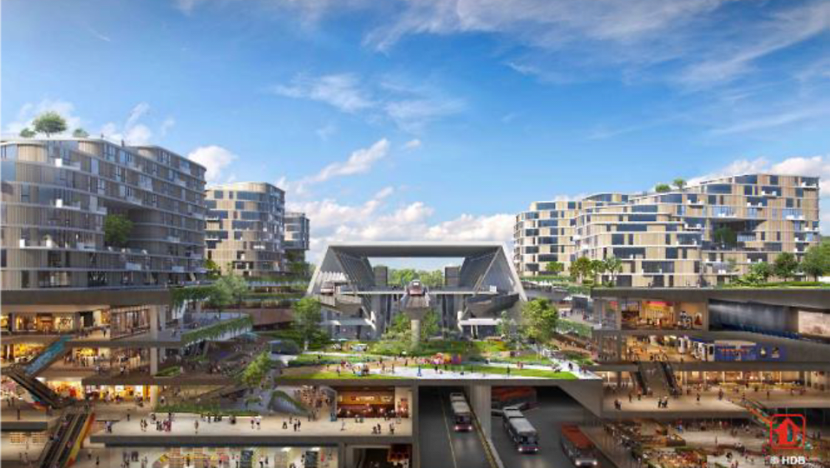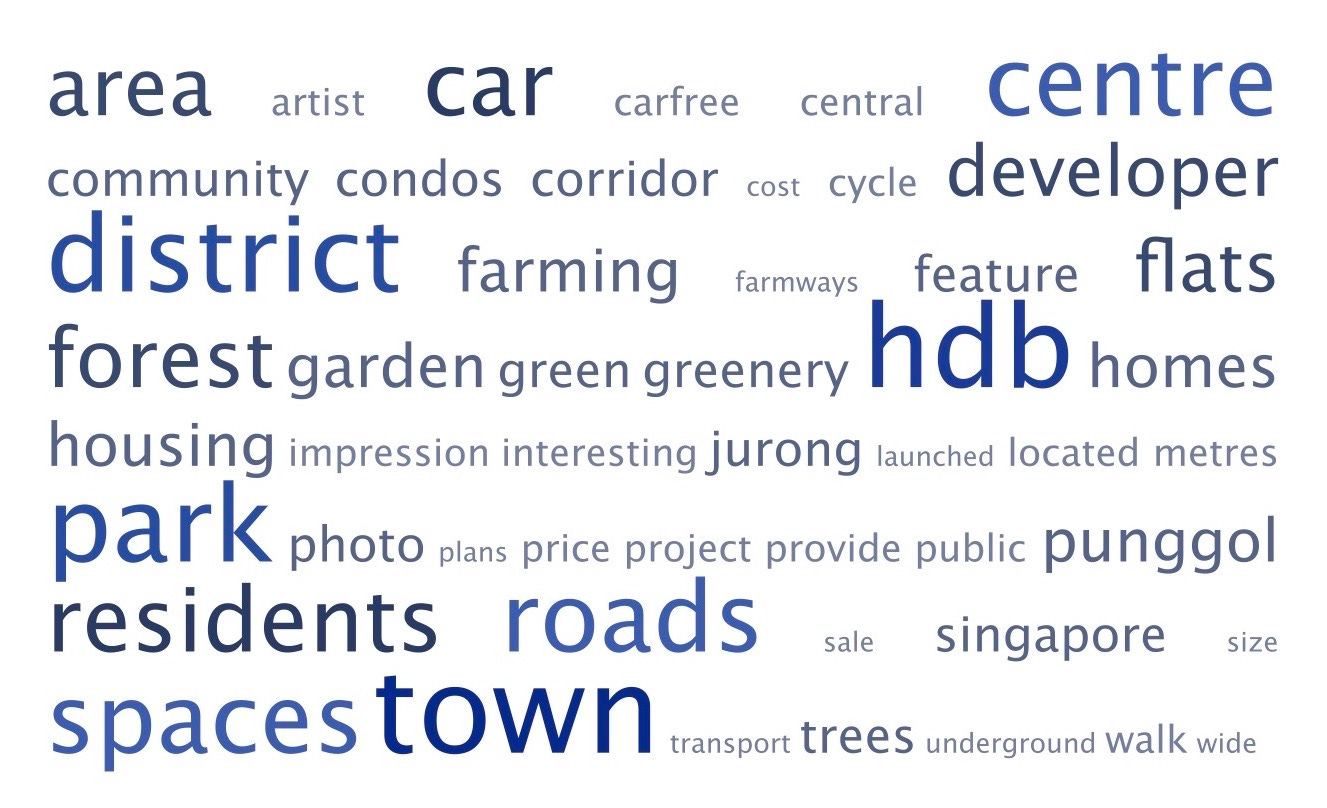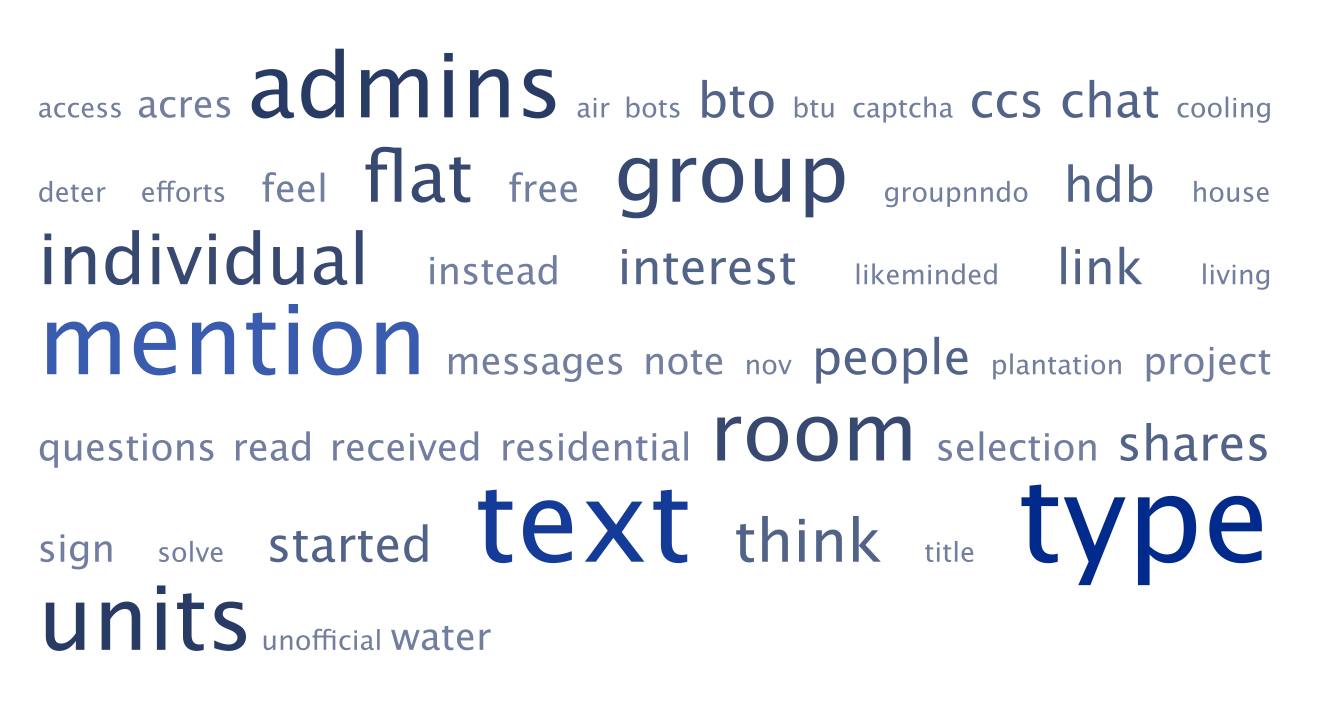Understanding Eco-Towns: An Analysis Of Environmental Efforts In Punggol And Tengah
In this piece, we look at Reddit and BTO Telegram group chats to uncover incoming residents of Singapore’s second eco-town to understand home owner views.
“Garden City”, “Greenest City”, City in a Garden”—are just some of the nicknames for Singapore. The city-state prides itself on being a bustling metropolitan city while maintaining a clean and green environment.
From the very start of Singapore’s independence, one of Lee Kuan Yew’s focuses was on making the city green. His vision for creating a garden city led to the creation of many environment- and sustainability-related policies and movements.
Recently, the Singapore government unveiled the Singapore Green Plan 2030, a nationwide movement to further the country’s agenda on sustainable development. Energy reset was named as one of the five key pillars of the plan; the pillar has targets such as “Green Energy”, “Greener Infrastructure and Buildings” and “Sustainable Towns and Districts”.
To achieve these targets, the Housing and Development Board (HDB) implemented various policies, one of which is a Green Towns Programme aimed at reducing energy consumption and recycling resources.
On paper, such plans certainly sound promising. But, how practical are they really? And, even if they do live up to their names, are Singaporeans—individuals so used to convenience and complaining—ready to live in such an environment?
How did Punggol fare?
It all began with Punggol, Singapore's first eco-town.
As part of the sustainable development model, Punggol was progressively made green over the decade, an effort achieved through capitalising on the surrounding nature and testing green technologies.
Figure 1: Number of Solar PV Systems (as at Q1 2021)
Source: Energy Market Authority (EMA)
Over the span of six years, the number of solar photovoltaic (PV) systems in Singapore increased by fivefold. Out of the 4,585 systems installed in the first quarter of 2021, 37.6% were accounted for by HDB.
Green initiatives that require little to no effort or changes from residents are definitely successful, as evident in the fast installation of solar panels on HDB rooftops and the intensification of greenery in communal spaces.
On the other hand, initiatives that require effort from residents seem to meet a different outcome.
A 2020 report said that Singapore’s recycling rate fell to a 10-year-low. While the pandemic played a part in the fall, other contributors include contamination—possibly due to the lack of education and awareness of recycling.
So, while Channel News Asia (CNA) articles boast the recycling efforts and dense cycling networks in the estate, Redditors have observed otherwise:
“Very few people in my specific cluster actually uses the recycling chute because it's smaller than the rubbish chute (can't fit bulky stuff) and has no foot operated opening (people scared to touch the handle). This is from feedback stated in the resident fb group.”
“Dense cycling network but for f***? The cycling networks don't go to industrial/office places such as in yishun/tampines/pasir ris. It's only really used for leisure. People going to work still have to navigate to the cluster f*** that is called punggol central.”
After the apparent achievement of Punggol, more estates were announced to become eco-towns, from Tampines to Choa Chu Kang. And, the most recent one being Tengah.
How do Singaporeans feel about the up-and-coming Tengah?
Tengah, dubbed “forest town”, is Singapore’s newest eco-town.
According to the HDB website, the key features of the estate will revolve around nature and the community, creating a town where its residents can be “At Home with Nature”. Tengah will be the first HDB town to be fully integrated with its surrounding natural environment, done so by capitalising on smart technology.
Figure 2: Artist's impression of Tengah’s car-free town centre
Source: HDB
What this entails is that Tengah will have a car-free town centre, where roads will be beneath ground level, in turn encouraging green commutes such as walking and cycling.
Conversations online about estates are small, but considering that few would go online to discuss housing estates, we retrieved 85 comments from six Reddit threads discussing the upcoming Tengah estate.
Figure 3: Frequency of top keywords
The wordcloud in Figure 3 shows that most Redditors feel positive or neutral about the project, as seen from keywords such as “interesting”, “spaces”, “residents” and “access”:
“Also, it’s good we’re no longer just building flats. We’re also considering the different components of a town; where people interact, how people get from one place to another.”
As the consequences of climate change become more apparent, people around the world have started to increase their appreciation for nature.
In a poll by the Urban Redevelopment Authority (URA), 80% of respondents said that parks, nature spaces and greenery are crucial to improving the quality of life in Singapore—in line with what netizens talk about relating to Tengah’s eco-town concept.
From the Reddit threads, HAMI identified 27 comments labelled as fearful.
However, the minority—whose opinions were not picked up in the wordcloud—mentioned worries relating to loud noises, fire and insects.
Among the comments are:
“Would rather have a place that is airplane-free than car-free. Living near the airbase and having to listen to the jet noise all day isn't worth all the shiny facilities they can come up with.”
“I wonder what will happen if a car catches fire on the underground roads. The whole tunnels will be full of smoke.”
“Be prepared for nests of mosquitoes and bugs in your home.”
Diving Into Telegram Group Chats For Tengah Home Owners
We used HAMI to analyse a Telegram channel for Singaporeans who have booked a Build-to-Order (BTO) flat at Tengah.
Figure 4: Frequency of top keywords from messages sent in 2022
While numerous topics of conversation take place in the group, it seemed that many revolved around matters including but not limited to the “selection” of BTO rooms, the “type” of “units” and even additional information about Tengah.
In particular, “air” was mentioned multiple times in topics such as the nearby “air” base and the installation of “air” conditioning.
Possible confusion surrounding the execution of a central cooling system
Many were concerned about the noise disturbance from the planes and the possible expansion of the Tengah air base.
When talking about air conditioning, many also brought up “ccs” which stands for centralised cooling system—of which future residents of Tengah will be the world’s first public housing township to experience the benefits.
Under the CCS, chilled water will be piped from rooftop tanks to homes along pipes—as opposed to the conventional air conditioning systems where compressor units are hung along the ledges of each unit.
Despite the cost and energy efficiency of the system, many in the group seem to be on the fence about installing CCS:
“CCS will save energy, but whether this there are costs savings and how much savings, will depend on the rates they charge”
“Damn it. This makes me contemplate my decision to installing CCS or not.”
“yeah, my concern is that if i sign up for CCS, i am bound to them for the service, maintenance and usage charges. if they charge high, i also LLST”
Conclusion
While some Singaporeans are going the extra mile to fight against climate change, we can see that most are carrying on Singapore’s legacy of being “Complaint Kings”.
Many of us are still largely unaware of the new initiatives that are being pushed out and care only when it becomes directly relatable to their lives—like how they will pay for air conditioning.
While there are successes with the upgrades in the current eco-towns, the mindsets of most residents (and non-residents) pertaining to the environment also require upgrades.
Data & Methodology
The data for the first segment of text analysis came from six Reddit threads with a total of 85 comments. The data for the second segment of text analysis came from a telegram group chat named "Tengah BTO", with a total number of 119705 messages. The data contained conversations on the chat group between 1 January 2022 and 26 April 2022.
Data sources:
Number of Solar PV Systems: Energy Market Authority (EMA)
Reddit Text Analysis: Thread 1, Thread 2, Thread 3, Thread 4, Thread 5, Thread 6
Tengah BTO, 1/1/22 to 26/4/22, 119705 messages.
Data was cleaned of symbols, emojis, and images using HAMI's built-in pre-processing packages. For further information on the methodology of this study please contact us at hello@hami.sg.



